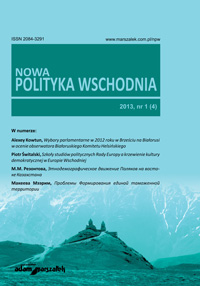Zabiegi Trzeciej Rzeczypospolitej o restytucję polskiego dziedzictwa kultury z Federacji Rosyjskiej (1992–2012)
Część I: W okresie prezydentury Lecha Wałęsy (do grudnia 1995 r.)
The Third Polish Republic’s Attempts at the Restitution
of Cultural Heritage from the Russian Federation (1992–2012) Part I: Lech Wałęsa’s Presidency (until December 1995)
Author(s): Dariusz MatelskiSubject(s): Politics / Political Sciences, Politics, Cultural history
Published by: Wydawnictwo Adam Marszałek
Summary/Abstract: Until the fall of the Soviet Union in December 1991, there was no possibility for Poland to regain its cultural heritage seized during the Second World War. From 1945 till 1991 Poland received from Moscow only a small percentage of the ar-chives taken away, collections of books, works of art and monuments – usually as a gift from the soviet nation. That is why the fall of the Soviet Union in 1991, as well as the process of regaining independence by former Soviet republics cre-ated the need of negotiations about Polish cultural goods with each of the Soviet Union’s successors.On 22nd May 1992 in Moscow, a treaty was signed between the Polish Republic and the Russian Federation about friendly and good-neighbourly relations. Back then, President Boris Yeltsin gave President Wałęsa documents from the Józef Piłsudski Modern History Institute, as well as two portfolios containing copies ofdocuments about the Katyń massacre. Furthermore, in May 1992 the Auschwitz books returned to Poland, taken away in 1945 and stored in a Special Archive in Moscow, now owned by Auschwitz Museum. It was only a fraction of the Pol-ish artefacts possessed then by Russia. From 29th June 1992 the Military ArchiveCouncil of the Ministry of National Defence was operating in Moscow and it re-vised more than 4 million files, out of which 430 thousand documents were cop-ied, coming from the Special Archive (Osobyj archiv) and from the Russian State Military Archive, that concerned Polish people in the Soviet Union from 1939 till 1940, as well as the Katyń massacre.During 22nd–23rd February 1993, the Head Office of the State Archives of the Polish Republic and the Archive Committee of the Russian Federation Govern-ment agreed on a source publishing titled Katyń. Documents of crime.Based on article 17th of the Polish-Russian treaty from 22nd May 1992 about friendly and good-neighbourly cooperation, on 22nd February 1994 both govern-ments signed an agreement about graves and memorials of war and repression victims. The Russian side announced that in May 1994 exhumation works would begin in Katyń and Mednoye.As a result of the Polish Ministry of Foreign Affairs‘ diplomacy, on 18th May 1994 in Warsaw an agreement about cooperation in revealing and returning cul-tural goods transferred to another country, was signed. In October 1994 Polish-Russian commission on revealing and returning cultural goods transferred to another country was gathered. The Polish side presented a list of wanted objects. Found files were to be returned to the other party. However, firstly Poland was demanding the return of the archives, which were supposed to be given away ac-cording to the Treaty of Riga and, up until 17th September 1939, were not.
Journal: Nowa Polityka Wschodnia
- Issue Year: 4/2013
- Issue No: 1
- Page Range: 138-169
- Page Count: 32
- Language: Polish

